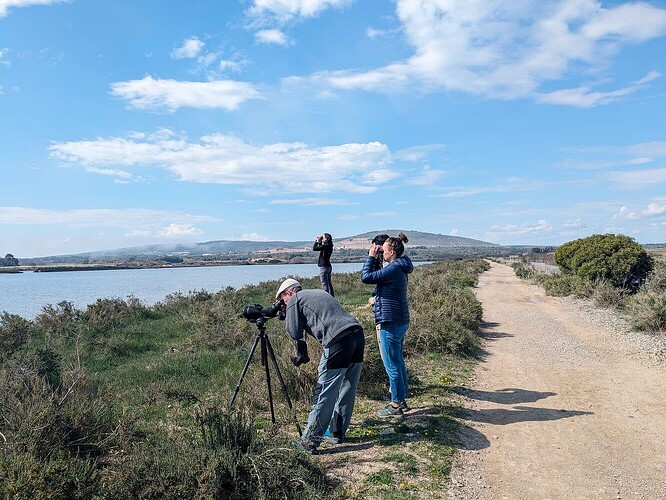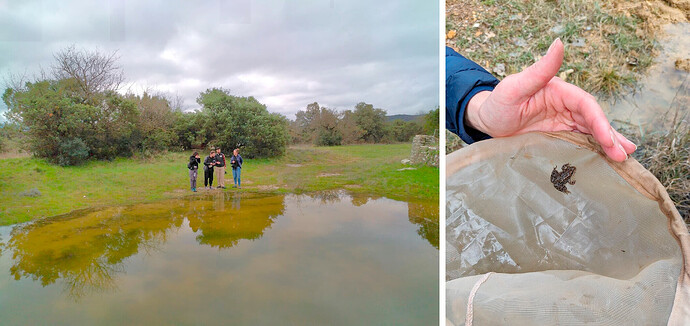A few weeks ago, Callum (@seadowg) from ODK visited CEN Occitane to conduct observational research in the field.
Together, we summarized below our top learnings and insights that we hope might be applicable to ODK users!
CEN Occitanie learnings
- We discovered a bit of the job of a developer and we both shared our constraints
- We had a true, balanced exchange, as when, as form designers, we discuss with our colleagues, the final users of our forms
- We understood how it must be difficult for a pure computer scientist or developer to understand final users contexts
- We also realized that, even if we build our forms with the users and we have skills in ecology, we should join our users on the field to better understand their needs, to probably enhance the form conception
- Not all of our forms make use of repeats, but some of them, not all, should be simplified.
- We discover offline entities on Callum's phone and a number of use cases ideasforum.getforum.gethave arisen since :
- trees inventory and description (micro-habitats) in a valley far from internet
- any field work dedicated to only one enumerator or terminal without connection
- We enjoyed showing Callum how ODK tools contribute to nature conservation and knowledge.
Things that might be applicable to other organizations welcoming an ODK Team member :
- We tried to involve the end-users on the ground, but in the end they couldn't join us. It's a pity and even if we prepared Callum’s visit together, I would have preferred them to discuss their field’s problems directly with Callum.
- Prepare well and keep in mind the things you want to discuss. Choose the relevant forms to test the things, face the issues. Even if we did, we forgot for example this use case
- Such a visit, from a member of such a team, is an honor for us, and it turned out to be a great team-building session with our young colleagues Maxime and Claire
ODK learnings
Callum spent a few days with the team in the field collecting data and observing how ODK is used in different scenarios. These insights help us understand what’s working well and what can be improved, and build empathy for people collecting data in different environments.
Research learnings
- We noticed Collect doesn’t use the form language that matches the UI (or device) language if no preference is set.
- The back button vs “up” didn’t feel intuitive in the hierarchy.
- Selecting one from the map is extremely useful in the field. The team has predetermined 100m squares that they need to visit; in a repeat, and then they filter out the ones that have been visited.
- Improving line styling on the map would make their work easier. Forum discussion
- Going to the project settings to change to satellite view was cumbersome. For example, sometimes, the line map isn’t accurate, and a satellite map would help them verify.
- Adding a scale reference to the map would eliminate the need to open other maps or use a paper scale.
- Showing the status of an item on a map would be valuable, so they can see how many subjects were found last time. Entities will make this easier to display the history.
- Displaying visual/media history on a map as an entity would be useful (e.g. images of the same place over time).
- CEN Occitane co-designs their forms with data collectors and it was clear from using those forms that they are carefully thought out to be as helpful in the field as possible
- Some data collectors follow the ODK forum and/or see new functionality in Collect and request those concepts from Mathieu and others designing forms.
Thank you to Mathieu, Nathalie, and the team for hosting, and organizing such an insightful research trip!
What’s next?
Our goal at ODK is to prioritize problems based on user needs. The insights gathered on this research trip are helpful indicators, combined with what we hear in user research sessions, feedback from Insiders, and what we see on the forum.
Once we start to see enough evidence about a particular problem area, we prioritize how we might improve that user experience. The product roadmap reflects these priorities, so everyone knows what we are working on now and what’s coming up next.
Want to share your experience using ODK?
As part of our user-centered design process, we always want to hear how ODK can support your workflows. Some of the other research trips we’ve done in the past are eHealth Nigeria in Kano, WHO teams in Nairobi / Somalia, and Yaw recently presented at the Alliance for Malaria Prevention's annual meeting in Nairobi. We are always open to research trips with different organizations!
Other ways you can share feedback:
- Share your experience on the community forum
- Join the Insiders program
- Get involved in user research with @aly_blenkin

